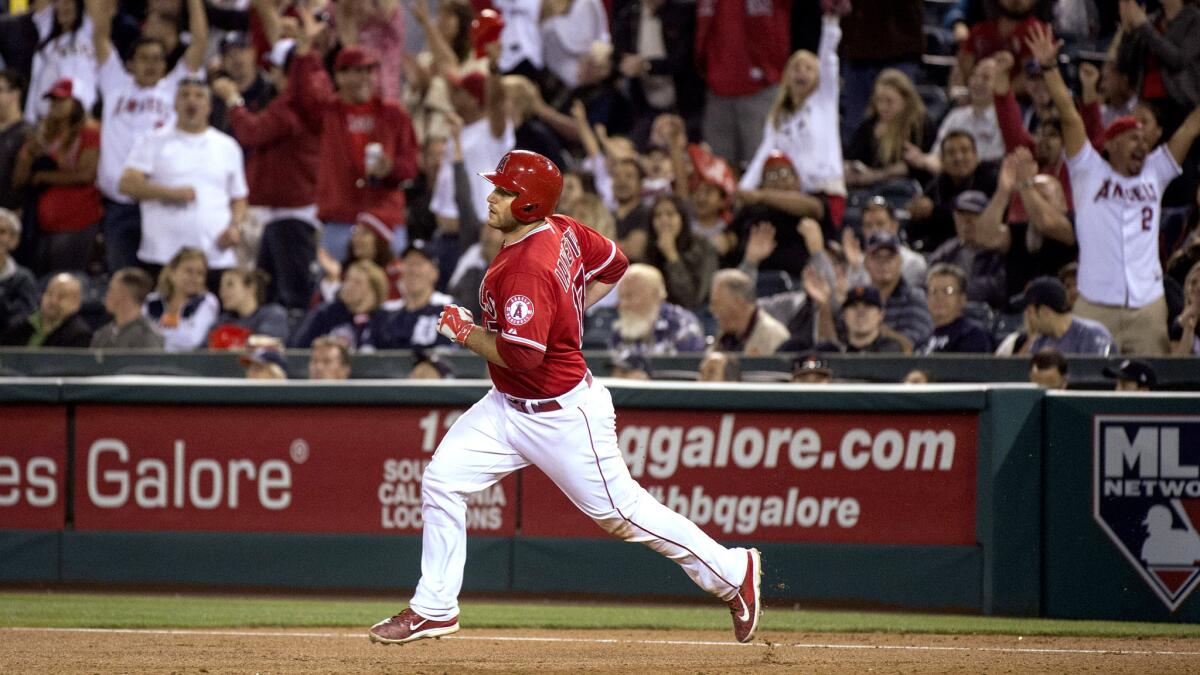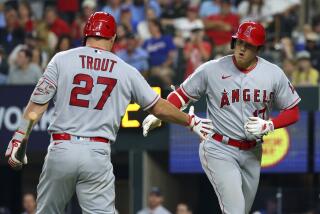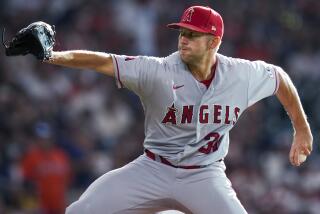Column: Angels catcher Chris Iannetta takes a big cut at the blues

Angels catcher
When the ball cleared the fence Thursday night at Angel Stadium, just to the left of the 390-foot mark in left-center field and near the Jersey Mike’s Subs sign, it wasn’t exactly a Michael Jordan “HE’S BACK!” moment.
Except, perhaps, somewhere deep in Chris Iannetta’s inner turmoil, it felt like one.
It was a grand slam, a nice exclamation point to a night when the impotent Angels offense had broken through. Iannetta’s blast made the Angels’ lead 12-1 in the seventh inning. Not a lot of drama there.
This was Game 48 of 162, and baseball, as well as Iannetta, are defined by numbers in September and October. Not April and May.
Still, the concern of Angels fans and front-office personnel over the early season hitting struggles of their starting catcher had to be eased a bit as the ball left the park.
When Iannetta was interviewed on the field after the game and asked the obvious question — why are you suddenly starting to hit? — he responded with the players’ staple in such situations.
“I’m seeing the ball better now,” he said, truly having no idea — like players and fans — why that was or what it meant.
It is probably more complicated. The numbers speak clearly to the spot he had been in and the relief, at least temporarily, he probably felt moving past it.
He had started the season with six hits in 67 at-bats, an .089 batting average. That’s not acceptable for very long, even if you are handling pitchers perfectly and throwing out base-stealers left and right.
Then, Iannetta started “seeing the ball” better.
“It started in San Francisco,” he said in reference to the Giants series the first weekend in May, “and since then, I could feel it coming back.
“Whatever it was, I was ready for it to end, for it to go away forever.”
If his next 34 at-bats are a viable sample, it may have.
In those, he collected 12 hits for a .352 average. His Thursday night blast gave him 13 RBIs, in just 18 total hits this season. Seven of his 18 hits have gone for extra bases and the grand slam was his third homer of 2015; also the fourth slam of his career. His current average is .178.
None of this number-crunching, nor its impact, are lost on Christopher Domenic Iannetta, 32, the son of Italian-born parents Domenic Iannetta and Maria DiLorenzo.
Before he was taken in the fourth round of the 2004 draft by the Colorado Rockies and left college, he was a math major at North Carolina. You don’t need calculus to know that .089 isn’t good.
His best seasons have produced batting averages in the mid-.250s, and he agreed in a recent interview that a .275 average would be an admirable career goal.
“I’ve got plenty of work ahead to get there,” he says.
Iannetta’s poor start was jarring to Angels fans on several fronts.
They still haven’t gotten over the departure of big-hitting catcher Mike Napoli, who left in a trade and recently crushed his former team, again, with a hitting barrage as his Red Sox took two of three in Boston.
Iannetta brought great hope in the wake of Napoli’s replacement, Jeff Mathis, who is with Miami now and carries a lifetime .195 average. The expectation with Iannetta was equal defensive prowess and improved offense. Clearly, .089 was not improved.
Then, there was the ever-present perception that, while catchers are crucial on all teams, they are doubly so on the Mike-Scioscia-managed Angels. There was little question about Scioscia’s career path after he finished playing because of the way he managed all elements of the game behind the plate with the Dodgers.
Perception isn’t always reality. Iannetta says he gets no extra pressure from Scioscia, as in: “In the good old days, we did it this way…” But he doesn’t deny that hiding any catching deficiencies is a lot tougher in Anaheim than elsewhere. Exhibit A: Napoli.
Into Iannetta’s early season nightmare came Carlos Perez, who was promoted from Salt Lake City on May 5 and hit a walk-off homer that night. Perez is hitting .273 through 13 games.
Among the first to greet Perez after his May 5 homer was Iannetta.
“I never want a break, I never want to come out,” Iannetta says. “But I also never want to see another player fail. I’ve been in situations where I’ve taken jobs from other players. I understand.”
You can’t get inside Scioscia’s head, but it seems reasonable to assume that the minute that grand slam cleared the fence Thursday night Iannetta had at least momentarily solidified his spot behind the plate.
Being a veteran of catching wars speaks volumes to managers, especially Scioscia. It also speaks volumes when a catcher who counts his best moment in the game not personal hits nor homers, but catching Jered Weaver’s no-hitter May 2, 2012.
Pitchers’ appreciation of their receiver also speaks volumes.
Matt Shoemaker calls Iannetta “a gem,” and “somebody you want to listen to.”
Thursday night’s Iannetta moment may turn out to be just that. A moment. Or it may be the pivot in a player’s season that was heading south.
Iannetta’s personality is quiet and thoughtful, even introspective. His broad view of what he does for a living brings a perfect perspective towhat makes baseball attractive and compelling.
He said that, for himself and other mortals (defined on the Angels as everybody except Mike Trout), baseball is something that “when it goes well, when everybody plays well, it is amazing. When it goes the other way, it couldn’t be worse.”
Thursday night, Iannetta got a taste of amazing.
Twitter: @DwyreLATimes
More to Read
Go beyond the scoreboard
Get the latest on L.A.'s teams in the daily Sports Report newsletter.
You may occasionally receive promotional content from the Los Angeles Times.







